Views from our members
Our Voice of the Veterinary Profession survey data gives a unique insight into the experiences and views of vets in the UK. Voice data supports our campaigning and media work, helps develop new resources to support the profession, boosts our social media campaigns and speaking events and strengthens our work lobbying for legislative and regulatory reform.
Here are some statistics from recent Voice surveys. For more visit the news pages or follow us on social media.


98% of vets say a workplace’s commitment to work-life balance is important when considering what makes a great workplace.

90% of vets in clinical practice are concerned about the importation of rescue dogs from abroad into the UK, with disease risk being the top concern (cited by 98% vets).

94% of companion animal vets reporting they have clients who feed a raw diet.
Jump to...
Vets on veterinary workplaces
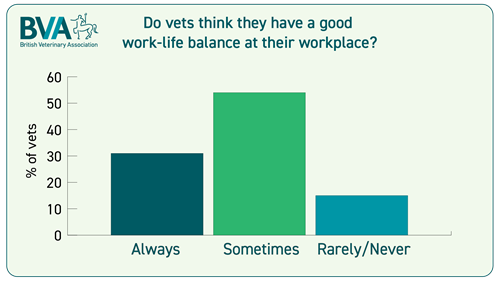
- 31% of vets believe they always have a good work-life balance at their workplace, 54% say they sometimes do, while 15% say they rarely or never do.
- 62% of vets working in clinical practice across the UK don’t always get breaks during their working day to eat and rest.
- 98% of vets say a workplace’s commitment to work-life balance is important when considering what makes a great workplace.
- 29% of vets working in the UK consider their workplace ‘a great place to work’, 57% consider it ‘a good place to work’ and 12% consider it ‘not a good place to work’.
- 4/5 of vets working in the UK consider their workplace supportive of staff. 11% consider their workplace unsupportive.
- When considering what makes a great workplace, 98% of vets consider a commitment to work-life balance to be important.
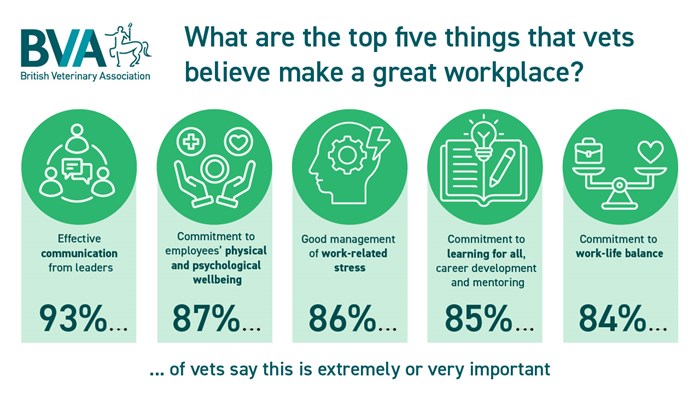
Vets on the importation of dogs
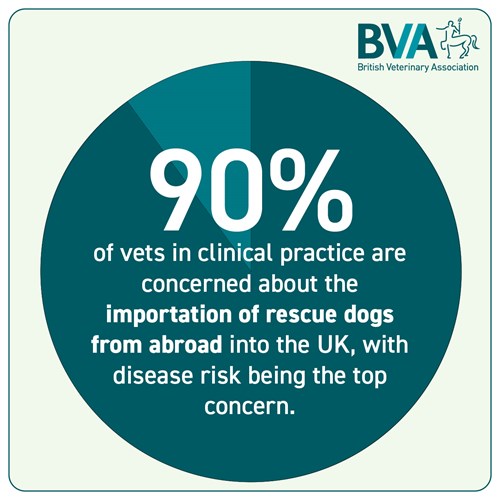
- 90% of vets in clinical practice are concerned about the importation of rescue dogs from abroad into the UK, with disease risk being the top concern (cited by 98% vets).
- Among vets who treat companion animals, 94% had seen rescue dogs from abroad in their practice in the last twelve months. Of these, 47% vets reported seeing novel or rare conditions associated with the importation of dogs.
- Among companion animal vets, just 45% feel confident that their practice has adequate risk assessments, appropriate PPE and training in place.
Vets on pet diets
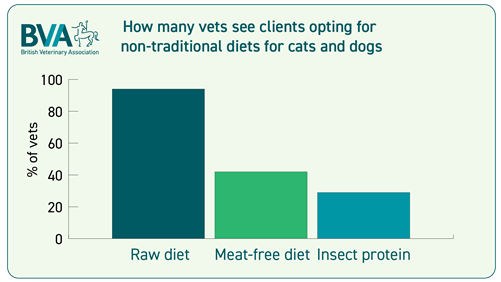
Many pet owners are opting for non-traditional diets for their cats and dogs:
- 94% of companion animal vets report they have clients who feed a raw diet.
- 42% report clients who feed meat-free diets.
- 29% report they have clients who feed insect-protein in place of meat.
However, clients are not routinely discussing dietary choices with their vet. 6 in 10 vets were unsure just how many of the cats and dogs they see are fed meat-free diets.
Vets on sustainability
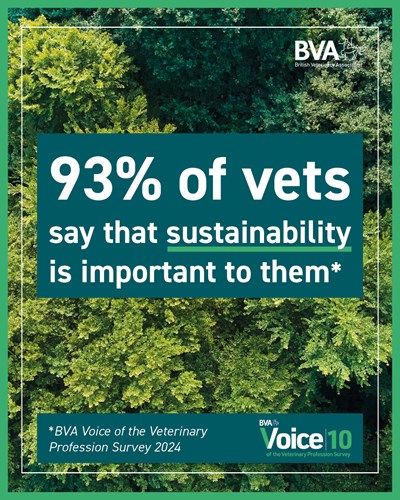
93% of vets say sustainability is important to them.
Around a third of vets (34%) report that their veterinary workplace has made a formal commitment to reduce its environmental impact, such as registration or participation in a formal sustainability scheme.
Vets on attitudes to the profession
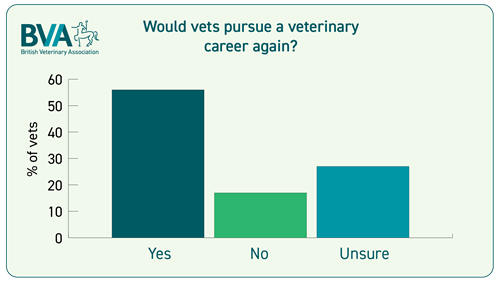
Pursuing a career in the profession
Vets were asked if they would choose to pursue a career in the veterinary profession again, ‘knowing what they know now’:
- Most active vets said that they would (56%).
- Just one in six vets reported that they would not (17%).
- One in four vets were unsure (27%).
Remaining in the profession
Active vets were also asked whether they thought they would still be in the profession in five years’ time.
- 60% reported they would still be in the profession in five years’ time.
- 46% said they would be in a similar role.
- 15% said they'd be in a different role.
- 22%, just over one in five vets, reported that they would not be in the profession in five years’ time.
- 18% were unsure.
Vets were asked to rate a series of aspects of veterinary work on a six-point scale from excellent to terrible. At least three quarters of vets rated the following aspects of their job as generally good (combining those who rated them as excellent, very good, or good):
- Job variety/interest (87%)
- Relationship with co-workers (87%)
- Job security (82%)
- Job satisfaction (78%)
By contrast, less than half rated the following aspects of their job as generally good:
- Pay and benefits (49%)
- HR support/ staff management (39%)
- Work-life balance (37%)
- Job related stress (19%)
53% of active vets rated veterinary work as generally good on public respect (including ratings of ‘Good’, ‘Very good’ and ‘Excellent’).
- 30% rated it as ‘Good’
- 18% rated it as ‘Very good’
- 6% rated it as ‘Excellent’
Vets on artificial intelligence
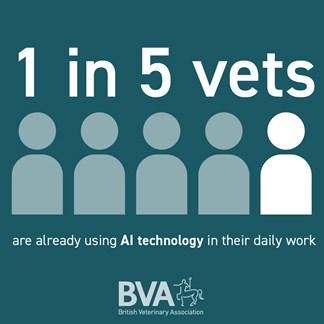
1 in 5 vets (21%) are already using AI technology in their daily work.
The most commonly reported uses of AI technology were:
- for radiography diagnostics and reporting (44%).
- for laboratory diagnostics and reporting (27%).
- in communications with clients (11%).
- or to assist with administrative work (7%).
Vets were also asked about the benefits and risks of using AI technology in their work.
The most common reported benefits were:
- Data interpretation (55%), allowing vets to process large datasets more quickly or accurately.
- Diagnostic testing (49%).
- Saving time more generally (40%).
- Routine admin tasks or note taking (38%).
The most commonly reported risks of AI were:
- The possibility that results are interpreted without context (83%).
- That AI is used incorrectly, without follow up checks (82%).
- An overreliance on AI undermining human skills (68%).
- A lack of data protection (25%).
Join Voice
Panel membership is open to BVA members who are veterinary surgeons or veterinary students based in the UK.
To join the Voice of the Veterinary Profession survey panel simply login to My BVA and subscribe via your member dashboard, or visit the Voice of the Veterinary Profession page directly.
Media enquiries
For more information, get in touch with our media team via email [email protected] or call 020 7908 6340.
